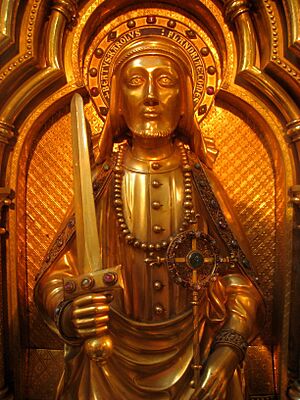Charles the Good facts for kids
Quick facts for kids BlessedCharles the Good |
|
|---|---|

Image of Charles I on his reliquary in the Sint-Salvatorskathedraal, Bruges, Belgium
|
|
| Count and Martyr | |
| Born | c. 1084 Odense, Denmark |
| Died | 2 March 1127 Bruges, County of Flanders (now Belgium) |
| Venerated in | Roman Catholic Church |
| Beatified | 9 February 1882 (confirmation of cultus) by Pope Leo XIII |
| Feast | 2 March |
| Attributes | sword |
Charles the Good (born around 1084, died March 2, 1127) was an important ruler known as the Count of Flanders. He led the County of Flanders from 1119 until 1127.
Charles is remembered for his good deeds and was later recognized as a saint. His life and tragic death were recorded by a writer named Galbert of Bruges. In 1882, Pope Leo XIII officially recognized him as "Blessed."
Contents
Early Life of Charles the Good
Charles was born in Denmark around 1084. He was the only son of King Canute IV (also known as Saint Canute) and Adela of Flanders.
A Difficult Childhood
When Charles was only two years old, his father was killed in Odense Cathedral in 1086. After this sad event, his mother, Adela, quickly returned to her home in Flanders. She brought young Charles with her. However, she left his twin sisters, Ingeborg and Cecilia, behind in Denmark.
Charles grew up in the court of his grandfather, Robert I of Flanders, and later his uncle, Robert II of Flanders. In 1092, his mother Adela moved to southern Italy to marry Roger Borsa, who was the Duke of Apulia. She left Charles to continue his upbringing in Flanders.
Travels to the Holy Land
Around 1107 or 1108, Charles went on a journey to the Holy Land. He traveled with a group of ships carrying people from England, Denmark, and Flanders. Some historians believe this was the fleet led by Guynemer of Boulogne. During his travels, Charles was offered the chance to become the king of Jerusalem. However, he chose not to accept this offer for reasons that are still unknown today.
Becoming Count of Flanders
In 1111, Charles's uncle, Robert II, passed away. His cousin, Baldwin VII of Flanders, then became the new count. Baldwin was several years younger than Charles.
A Trusted Advisor
Charles became a close advisor to Count Baldwin VII. Around 1118, Baldwin helped arrange Charles's marriage to Margaret of Clermont. Margaret was the daughter of Renaud II, Count of Clermont, and she was an heiress, meaning she would inherit land and wealth.
Count Baldwin VII did not have any children. In September 1118, he was hurt while fighting in a battle. Before he died on July 17, 1119, he chose Charles to be his successor. This meant Charles would become the next Count of Flanders.
Challenges as Count
In 1125, Charles faced a difficult time. A severe famine, or food shortage, hit his lands. He believed that some people, including Jewish merchants, were making the famine worse by unfairly raising food prices. Because of this, he made a decision to expel Jews from Flanders.
During the famine, Charles worked hard to help his people. He gave out bread to the poor. He also took steps to stop people from hoarding grain and selling it at very high prices. His advisors encouraged him to take action against a powerful family called the Erembalds. This family was heavily involved in hoarding grain. Charles began legal steps to reduce their power and status.
At the same time, Charles was considered a possible candidate to become the King of the Romans after the death of Henry V. However, he turned down this important offer.
The Death of Charles the Good
The Erembald family, who felt threatened by Charles's actions, planned to get rid of him. Fr. Bertulf FitzErembald, a leader at the Church of St. Donatian, was the main person behind this plan.
A Tragic End
On the morning of March 2, 1127, Charles was praying in the church of St. Donatian. A group of knights working for the Erembald family entered the church. They attacked him with swords and killed him.
This brutal killing of a popular ruler, especially in a church, made people very angry. Charles was immediately seen by many as a martyr (someone who dies for their beliefs) and a saint. Even though he was not officially recognized as "Blessed" until 1882, people honored him right away.
Justice for Charles
The Erembalds, who had planned Charles's murder, were soon surrounded. The angry nobles and common people of Bruges and Ghent trapped them inside the castle of Bruges. All the people involved in the plot were caught. They were punished for their terrible crime.
King Louis VI of France had supported the uprising against the Erembalds. He used his influence to help choose William Clito as the next Count of Flanders.
See also
 In Spanish: Carlos el Bueno para niños
In Spanish: Carlos el Bueno para niños
 | Charles R. Drew |
 | Benjamin Banneker |
 | Jane C. Wright |
 | Roger Arliner Young |

